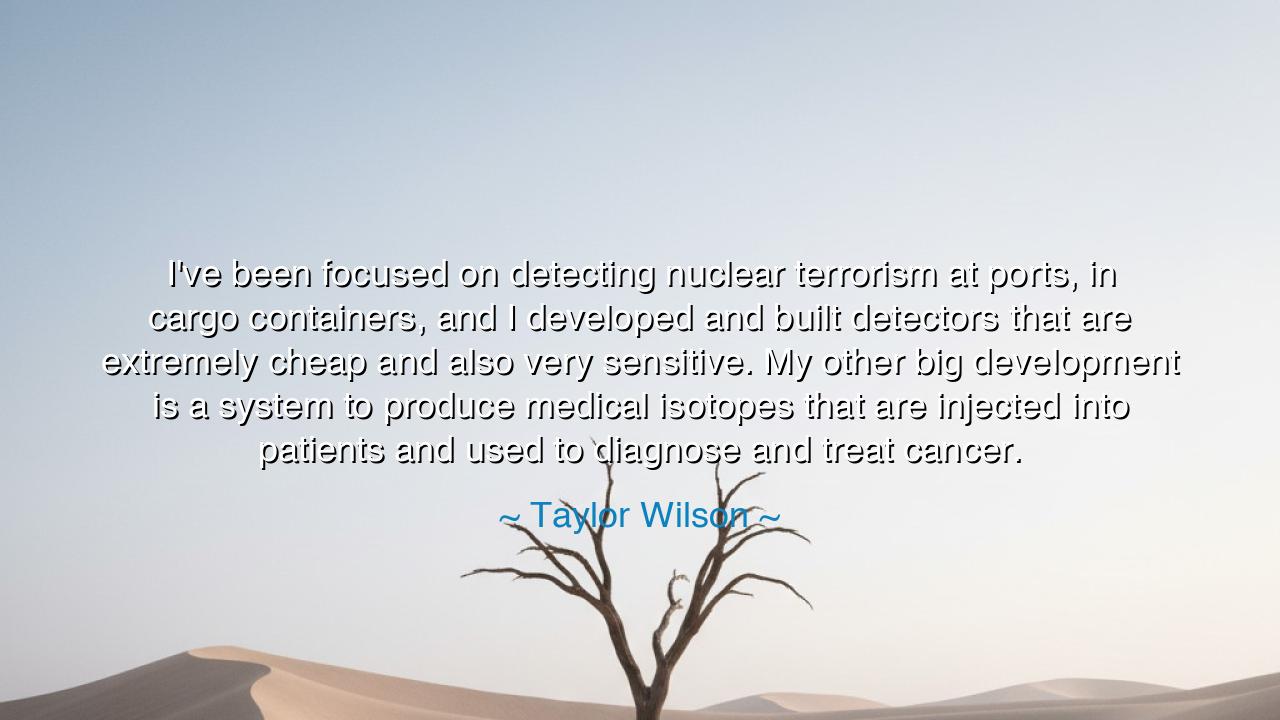
I've been focused on detecting nuclear terrorism at ports, in
I've been focused on detecting nuclear terrorism at ports, in cargo containers, and I developed and built detectors that are extremely cheap and also very sensitive. My other big development is a system to produce medical isotopes that are injected into patients and used to diagnose and treat cancer.






In the words of Taylor Wilson, we hear not merely the musings of an inventor, but the cry of one who shoulders the burdens of an age shadowed by both terror and hope. He speaks of nuclear terrorism, of ports and containers where hidden fire might lurk, and of the guardianship he has sought to fashion through detectors—cheap, sensitive, and vigilant. Yet in the same breath he turns from war to healing, from fear to compassion, telling of his work with medical isotopes, those unseen agents that flow through the veins of the sick to reveal their hidden afflictions and to burn away the darkness of cancer. Thus in his voice, there is the duality of humankind: to destroy, and to save.
From ancient times, mankind has wrestled with the twin faces of knowledge. Prometheus gave fire to mortals, but with fire came both warmth and ruin. In Wilson’s words, we hear the echo of Prometheus once more. The power of the atom, the fire locked in its heart, can be turned toward monstrous terror or radiant salvation. He, like Prometheus, has chosen to bear this fire not for conquest, but for guardianship and healing. His story reminds us that every great discovery carries within it a question: shall it be turned toward the chain, or toward freedom? Toward the wound, or toward the balm?
Consider the tale of Marie Curie, who unearthed the secrets of radioactivity with hands that would one day be scarred by the very forces she discovered. Her labor brought forth new understanding and tools for the curing of disease, yet she also opened a path that others would march upon toward devastation. Her life was both warning and blessing. And in the footsteps of such pioneers, Taylor Wilson has walked—choosing the road that shields the innocent and lifts up the suffering.
When Wilson speaks of detectors at ports and harbors, he evokes the guardians at the gates of cities in ancient lore. As sentinels once watched for invading armies at the walls of Troy or Babylon, so too do these humble machines—crafted with ingenuity rather than brute force—stand watch for invisible threats that could level cities. They are the modern shields at the gates, silent and unseen, but indispensable. In their cheapness and sensitivity lies not mere engineering, but wisdom: for what good is a guardian if it cannot be afforded, if it cannot reach the places where danger is most likely to enter?
Yet when he turns to speak of medical isotopes, his tone becomes that of the healer, the physician of old who sought to see within the body as a priest might divine omens in the flame. These isotopes, subtle and unseen, are injected into patients and become lights in the darkness of the flesh, revealing the hidden enemy of cancer and guiding the hand of healing. Here is the alchemy of compassion: the same atom that could destroy a city is instead used to rescue a life. Thus, the fire is purified by the intent of the heart.
The lesson is clear: knowledge is not evil, nor is it good. It is the wielder who determines its path. As the sword may guard the innocent or slaughter the weak, so may the atom save or condemn. Wilson’s quote is a reminder that each person, though perhaps not working with atoms, holds powers in their daily life—powers of speech, of labor, of invention, of influence. Each of these may be turned toward harm or toward blessing.
And so, children of the future, learn this: use your gifts as shields, not swords; as medicine, not poison. If you build, build so that others may be safe. If you invent, invent so that others may be healed. If you speak, let your words be like light in darkened places. The path of wisdom is not to shun power, but to wield it with a heart attuned to mercy and justice.
In practice, let each one of you seek ways to serve as Wilson has: find where danger lurks and seek to guard against it, whether in your home, your work, or your community. Seek also where suffering festers and be as the isotope—subtle, precise, but radiant with healing. In doing so, you will not merely echo the words of Wilson, but fulfill the eternal calling of mankind: to be both guardian and healer, wielder of fire yet servant of life.






AAdministratorAdministrator
Welcome, honored guests. Please leave a comment, we will respond soon